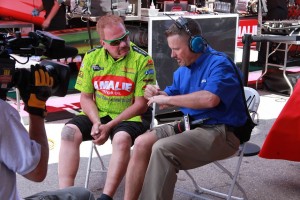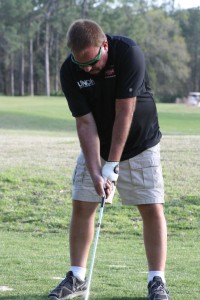Biomet joins Top Fuel dragster Terry McMillen as sponsor

Elkhart, Ind. (March 8, 2012) – Hoosier Thunder Motorsports, a leading competitor in the National Hot Rod Association’s (NHRA) Top Fuel Class announces it has added Biomet, Inc., a global leader in the manufacture of orthopaedic and dental medical devices, to its roster of sponsors. Biomet has agreed to sponsor Hoosier Thunder Motorsports for the 2012 season.
Terry McMillen, team owner/driver for Hoosier Thunder Motorsports, is a recipient of two Biomet Oxford® Partial Knees that revitalized his drag racing career. “Biomet not only gave me my career back – they gave me my life back,” McMillen said. “I was at a point in my career that I started thinking if I can’t get out of this car quicker I could be in danger if something happens. My old knees just wouldn’t work like they were supposed to. At the end of the day all I wanted to do was put my old worn out knees in ice.”
Todd O. Davis, VP of Global Marketing, said “Terry’s enthusiasm to share the message of his life-changing decision to have partial knee replacement surgery is contagious. When we recognize that Biomet’s products help one surgeon or one clinician improve the life of one patient, and this happens over 1 million times per year, we begin to appreciate the value and importance of our work. Terry’s story reinforces that message and our sponsorship allows us to continue to spread the word about joint replacement as a treatment option for those suffering from severe joint pain.”
 In November of 2010, McMillen had reached the end of his rope. Due to his constant debilitating knee pain, Terry began to consider giving up the career that he loved. After consulting with his physician and exploring his options, he decided to get two Biomet Oxford® Partial Knees before the 2011 season began.
In November of 2010, McMillen had reached the end of his rope. Due to his constant debilitating knee pain, Terry began to consider giving up the career that he loved. After consulting with his physician and exploring his options, he decided to get two Biomet Oxford® Partial Knees before the 2011 season began.
A quick 10 weeks later, McMillen defeated defending NHRA World Champion Larry Dixon in the opening round of the Winter Nationals in southern California, a thrill McMillen surely would have missed had he not chosen to replace his knees.
“With help from Biomet’s Oxford® Partial Knees, I can golf again,” McMillen said. “More importantly I felt safe driving my 300 mile-per-hour NHRA Top Fuel Dragster again.”
“My biggest complaint is that I waited too long to get this procedure done. That’s the message I want to get out to everyone. If you have a bad shoulder, a bad hip – or like my case, two bad knees, get an appointment with your doctor, talk about your options and consider Biomet for your joint replacement needs. I did and it changed my life.”
For more information, visit oxfordknee.com.
Not all patients are candidates for partial knee replacement. Only your orthopedic surgeon can tell you if you’re a candidate for joint replacement surgery, and if so, which implant is right for your specific needs. You should discuss your condition and treatment options with your surgeon. The Oxford® Meniscal Partial Knee is intended for use in individuals with osteoarthritis or avascular necrosis limited to the medial compartment of the knee and is intended to be implanted with bone cement. Potential risks include, but are not limited to, loosening, dislocation, fracture, wear, and infection, any of which can require additional surgery. For additional information on the Oxford® knee, including risks and warnings, talk to your surgeon and see the full patient risk information on Biomet.com.
While the patient in the story is a true recipient of this device, results are not necessarily typical, indicative or representative of all recipient patients. This device has been used successfully in achieving restored mobility to many patients. However, as with any implanted device, there are surgical and postoperative factors affecting performance, which ultimately result in unpredictable variable outcomes, including levels of mobility and pain. These factors include, but are not limited to, the patient’s pre- and postoperative health conditions, weight, activity level, and adherence to instructions regarding the use of the device. Due to these variables, it is not possible to predict or warrant specific results or patient satisfaction.









